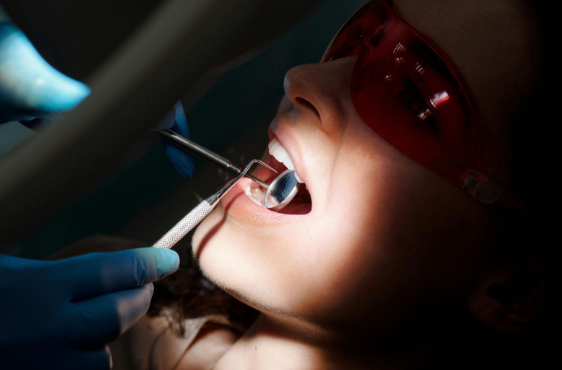Gateway Family Dental Blog
Dental Implants vs. Dentures: Which Should You Choose?

In the United States, Americans lose an average of 12 teeth by the time they turn 50, which is about twice the rate of the rest of the world. Although losing your teeth is a source of distress for several people, with multiple dental procedures available, it doesn’t have to be. For people missing one or more teeth, there are a few options you can choose to help restore them—the most common ones being dental implants and dentures.
There are a lot of factors at play when it comes to choosing between dental implants and dentures, from price to feel to jawbone health. They both come with their own set of pros and cons, so if you’re having trouble deciding, here’s what you should consider before making your decision.
What Are Dentures?
Dentures are custom-made, removable teeth replacements that are usually made with an acrylic base and resin or porcelain material for the teeth. Some dentures come with a lightweight metal framework to provide more stability and support. Dentures come in two types depending on how many teeth need to be replaced.
1. Complete Dentures
Complete or full dentures are used when all the teeth on the upper, lower, or both jaws need to be replaced. Since they aren’t placed over existing teeth or any other supportive structure, they need to rest directly on the gums.
2. Partial Dentures
Partial dentures are used to fill in gaps in the teeth and are held in place by clasps that fit around the existing teeth. They are usually the recommended option for people missing some teeth on the upper or lower jaw but who do not qualify for dental implants or dental bridges.
What Are Dental Implants?
Dental implants are permanent teeth replacements that have become a popular alternative in dental care in the past few years. Implants involve titanium rods or screws that are implanted into your gum tissue, essentially acting as artificial roots. The implant becomes a base for a permanent tooth replacement (also called a crown) that looks and feels like a real tooth.
Now that you have an idea of both options, let’s break down the important aspects of both so you can make an informed decision.
Cost
For Dentures
Dentures are more affordable than dental implants, although it’s important to keep in mind that dentures may need to be replaced, which can add up in the long run. A basic set of dentures (both upper and lower jaw) can start at $300–$500 per plate but can go up to $2,000–$4,000 for a premium set.
For Dental Implants
Dental implants are a permanent fix, so they are more expensive than other dental procedures like dentures and dental bridges. Prices can vary depending on various factors, but the American Dental Association (ADA) puts the average cost of a dental implant at anywhere between $1,600 to $2,200 per tooth.
It’s also important to note that your insurance might cover up to 50% of the cost for your dentures, but dental implants are usually considered to be a cosmetic procedure, which makes them less likely to be covered.
Procedure
For Dentures
Since dentures are removable prosthetics, it has a somewhat simpler and non-invasive process for the patient. The dentist will first have to take an impression of your upper or lower gums (or both) to see if dentures are necessary for all your teeth. They will also study the alignment and bite of the upper and lower jaws to make sure the dentures fit naturally to help with speech and chewing.
Initially, a preliminary set of dentures will be used as a trial to see if any adjustments are needed, after which the final set will be made.
For Dental Implants
Unlike dentures, dental implants require you to have enough existing bone to insert the metal rods or screws that will then hold the crowns. The procedure involves extracting the damaged root before drilling a hole into the jawbone.
The metal root is then inserted into the bone, but the tooth will only be fitted once the bone has started to grow around the metal root to secure it in its place. This can take a couple of months, after which the root will need an abutment (the connecting piece between the implant and the crown) before the tooth is fixed.
Maintenance
For Dentures
Dentures require daily maintenance to make sure they last as long as possible. Research shows that the survival time of dentures increases when they are well taken care of. Dentures need to be removed and brushed after eating every day and should be soaked in water or a cleaning solution overnight.
Since the structure of your jaw and gums can change with age, your dentures may need to be refitted occasionally to align with your bite.
For Dental Implants
Dental implant care is very similar to regular dental care—it involves brushing your teeth twice daily, flossing, and getting dental checkups. Since dental implants are meant to mimic natural teeth, engaging in proper oral and dental health is sufficient.
Like natural teeth, however, dental implants can become cracked or broken, at which point you may need to get them replaced.
Comfort
For Dentures
If your dentures aren’t secured properly, they can slip out of place when you eat or speak. While this won’t be a problem when they’re well fitted with denture adhesive, over time the wear and tear can make them slightly uncomfortable. Some common complaints about dentures include bulkiness, soreness, excess saliva, and in some cases, sores or ulcerations forming on the gums.
For Dental Implants
Since dental implants are inserted into your jawbone, they don’t cause the same discomfort as dentures. Implants are designed to feel natural in your mouth, and if they do cause any discomfort, it’s usually only initially and goes away after a couple of weeks.
However, as with any procedure, dental implants can create complications like infection or mechanical problems from improperly fitted parts. Studies found that dental implant complications can occur about five to ten percent of the time, but in most cases, dental implants make for a much more comfortable experience.
Factors to Consider before Making a Decision
Age
Since dental implants are permanent solutions, they make a more viable choice for people around the age of 60 or younger since they can use the implants for decades to come.
Older adults, on the other hand, might find dentures more cost-effective and easy since getting dentures is a faster, cheaper, less time-consuming, and minimally invasive procedure.
Hygiene
Dentures require a lot more care than dental implants, so if you or someone else are unable to provide them with the proper care, implants might be a more preferable option. Although dental implants are more expensive right out the gate, not caring for your dentures will lead to you needing a replacement sooner rather than later, which adds up to more expenses.
Existing Bone
Dental implants require a certain amount of existing bone density in order to go ahead with the procedure. If you have experienced any bone loss due to injury, age, or disease, you may not qualify for dental implants.
Dental bone grafting is a procedure that can be used to improve your jawbone density, although it is a more expensive process.
Takeaway
The decision between dentures and dental implants is not one to be made lightly and one you should definitely discuss with your dentist. Based on your needs and situation, however, the following points should be considered so you can make a confident and informed decision.
● Dental implants are more expensive than dentures, but they can hold up for over 20 years, where dentures are likely to need replacements every 7–10 years.
● Dentures don’t need any existing bone structure to be used, but dental implants require enough existing bone structure to safely anchor the prosthetic tooth to the jawbone.
● The procedure for dentures is quick and non-invasive, while dental implants require the dentist to drill into the bone.
● Dental implants just need regular oral care, but dentures require constant maintenance to last longer.
● Dental implants are usually much more natural-looking than regular dentures; however, if you’re willing to get your dentures custom-made by a professional, it might not show much of a difference.
Dentures and dental implants come with their pros and cons, but there’s one thing they can both do for you—they don’t just restore your teeth, but also your health and confidence. And at Gateway Family Dentistry, we believe in empowering each and every one of our patients with a beautiful and healthy smile.
If you’d like to learn more about dentures and dental implants, reach out to us! Our staff is always happy to answer your questions and help you decide which procedure is right for you. We’d love to hear from you and help you take care of all your dental needs, so contact us today!




